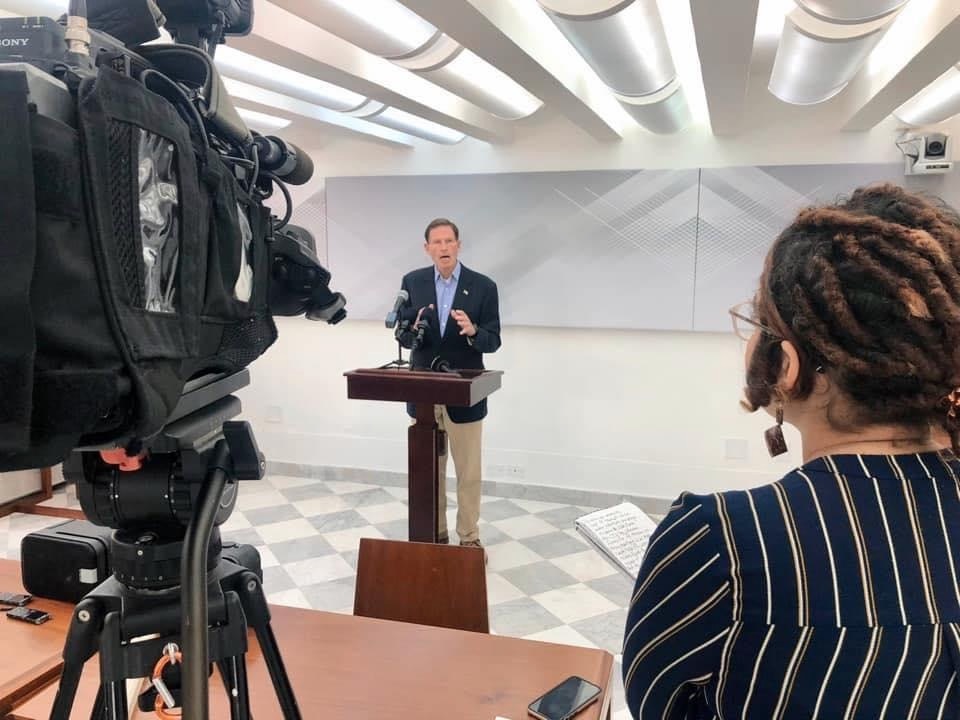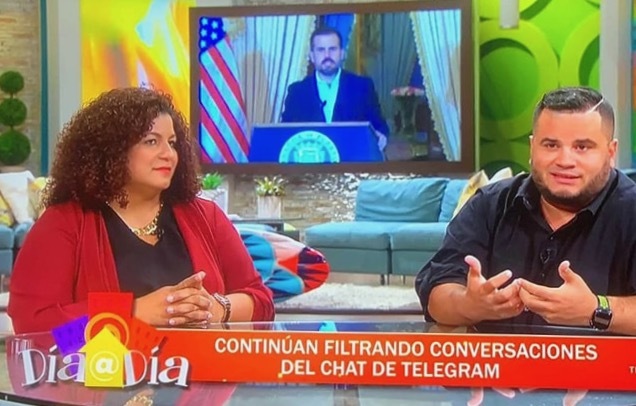Puerto Rican officials use ‘fake news’ laws to dodge tough questions. Journalists are pushing back.

In Puerto Rico, government officials have banned so-called “fake news” with a pair of newly passed laws that criminalize the work of investigative journalists exposing political corruption.
To fight back, journalists are suing Gov. Wanda Vázquez and other Puerto Rican government officials for violating their constitutional rights to free speech and free press. Sandra Rodríguez-Cotto, a plaintiff in the lawsuit, said these laws have created obstacles for journalists trying to cover the government’s response to the global COVID-19 pandemic.
“Who in the government can tell what is fake and what is not fake?” Rodríguez-Cotto asked rhetorically. “They don’t want us to ask tough questions or to reveal what they’re doing.”
The laws, passed earlier this year, make it a crime to share information that the government deems to be false about emergencies in Puerto Rico. People who are considered to be spreading misinformation could spend up to three years in jail and could be fined up to $5,000. The journalists’ lawsuit, filed May 20 by the American Civil Liberties Union of Puerto Rico, aims to end those penalties.
Puerto Rican journalists often expose corruption on the island, and the politicians they cover often respond with hostility or indifference. The Open Data Law and the Transparency Law also give Puerto Rican government agencies more time to come up with a response to information requests from the press, making it harder to produce investigative work.
“Many corruption cases have come out thanks to…journalists that are dedicated,” said Mayra Colón, a Puerto Rican resident from the town of San Lorenzo. “When the cases do come to light, the government officials get upset and speak bad of the press.”
Last year, the Center for Investigative Journalism published 889 pages of a Telegram chat between former Gov. Ricardo Rosselló and other members of his administration. Many Puerto Ricans considered the chats from the encrypted messaging app to be offensive and raised questions about possible conflicts of interest and law violations among government officials.
The chat’s publication led to weeks of mass protests in Puerto Rico and around the world, eventually resulting in Rosselló’s resignation on Aug. 2, 2019.
“The government tries not to release much information based on those laws,” said Angélica Serrano-Román, a journalist with the Center for Investigative Journalism in Puerto Rico. “They ignore my messages. They ignore my phone calls. If I send an email to an agency one day, it takes months to receive a response.”

Luis Joel Méndez González, an intern for the newspaper Metro Puerto Rico, recalled asking the Puerto Rican government for data about how many Chinese people get killed on the island. Three weeks later, he received data about Asian people overall, not specifically Chinese people like he asked for.
“The statistics and data here are complicated because the government does not know how to classify them and organize them well,” Méndez González said. “When we ask for specific data, it is not specifically defined.”
Crises like Hurricane Maria, Rosselló’s resignation and now, the coronavirus pandemic, have highlighted the government’s refusal to communicate openly.
Rodríguez-Cotto said she began to distrust the Puerto Rican government in 2017 during the aftermath of Hurricane Maria. At the time, she was volunteering as a reporter for WAPA radio and discovered discrepancies in the death toll data provided by the government.
“As the days and the weeks went on, we knew there was an effort from the government to avoid answering any of our questions or suspicions about it,” Rodríguez-Cotto said.
In April, Puerto Rican officials were accused of trying to silence the press after they excluded certain journalists and media outlets from participating in official coronavirus task force briefings hosted by WIPR-TV, a government-funded Puerto Rican television station.
“Unfortunately, everything indicates that WIPR will follow the instructions of La Fortaleza (the Governor’s Mansion) in wanting to silence the press, something that even President Trump will not dare to do,” Telemundo Puerto Rico President Jose Cancela wrote in an April statement.
Serrano-Román said some journalists grow frustrated during official government press conferences because they are very limited on what they can ask if their questions aren’t about the specific topic at hand.
“When there are press conferences that are very important, sometimes to avoid too many questions from the press, the government only allows one journalist to attend and only ask one question,” said Serrano-Román. “It’s difficult because sometimes we want to ask follow up questions because their answers are not sufficient enough.”
Colón, the San Lorenzo resident, said that kind of behavior makes her distrust public officials.
“I believe in the press,” said Colón. “Who I don’t believe in is no politician in Puerto Rico.”
Julian Berger is a junior at the University of North Carolina studying journalism and Hispanic studies. He works as a part-time reporter for La Noticia, a Spanish-language outlet that covers his hometown of Charlotte, North Carolina. Reach him at julianb [at] live [dot] unc [dot] edu and on Twitter @julianrberger.